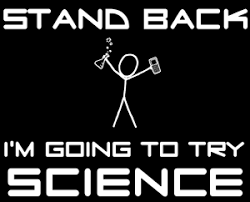
From Terry J:
"Evolution is accepted by everyone but the climate types. The entire earth history says it will change, but does not say any given species will like the change. Adaptation is considered a key factor in evolution, but apparently no longer functions."
Katherine offers:
"It’s a mistake to try to control CO2 to the detriment of prosperity when that prosperity is what would enable people to adapt to climate change–whether for warmer or cooler."
The idea behind this meme is that science, aided by the invisible hand of the marketplace, has overcome all obstacles to achieve our current prosperity, and that to argue that climate change is a serious problem that must be addressed is to foolishly ignore the track record of science and innovation in moving society ever forwards. Science will save us.
One way to examine this thesis would be to look at societies that failed in the past, and ask if we are immune to the same failings because we are richer, with more knowledge of the natural world and better technology. A good examination of this can be found in Diamond's Collapse. Another would be to compare the anticipated effects of global warming with a reasonable projection of the technology we are likely to have when, say, sea level rise threatens every coastal city, town and village in the world with inundation.
But here at theIT, we try to keep things simple, and leave the heavy stuff to the real scientists: see the blogroll for a list. ("The Science of Doom," in particular, is an amazing blog that deserves more traffic. And of course RealClimate, they just go from strength to strength over there.) But here we are. Is there an easier way to refute this argument than to delve into the details of the scope of the problems and the powers and limits of science?
In fact, there is. The we need not dispute the literal truth of the statement, in fact, to do so. Will science save us? I put it to you that science has saved us. It's done.
Consider a society which collapsed due primarily to self-inflicted ecological damage: Easter Island (Diamond again!). They deforested their island, lost the ability to build canoes (because they had no suitable wood), lost much of their ability to fish (no canoes), lost soils to erosion, and eventually lost most of their population and civilization, with evidence of widespread cannibalism.
In the time this was happening to them, the Easter Islander did not know what the deforestation would do, had little concept of soil erosion and other ecological disasters, and had no records or history of societies confronting similar challenges, successfully or unsuccessfully.
Consider our situation. What has science done for us so far?
1. Science has clearly demonstrated the world is warming, and that dangerous consequences will follow from that. Without science, we would not even be able to identify the problem (as happened on Easter Island.)
2. Science has determined the cause of the warming (man-made greenhouse gases).
3. Science has provided us with technologies that allow us to address the problem (which requires us to greatly reduce our output of GHGs) without sacrificing our modern lifestyle: Because of science we have nuclear, solar, and wind power; we have efficient insulation and low-drag vehicles; we have trains and buses; we have the internet.
Science has identified the problem, found the source of the problem, outlined a solution, and provided technology to make the solution relatively painless (an estimated two-tenths of a percent of GDP to transition to a low-carbon economy).
Global warming deniers want to position themselves as optimistic people with great faith in science and the future, but there's an old joke about faith that applies here:
A God-fearing man falls from a ship into the ocean. He is frightened, but he knows God loves him and will save him. He prays to God to save him and focuses on his absolute belief that God will save him. After a while a fishing boat comes by. "Here, grab this line and we'll pull you out of the water!" the captain says. "No, thank you, but God is going to save me" the man says. So the boat leaves, and a rich man's yacht comes by. "Here, grab my hand and we'll pull you in!" they say. "No, thank you, God is going to save me" the man says. Finally a Coast Guard cutter comes by, but the same conversation is repeated again.
Finally the man drowns. And because he is a good man, just a little thick, he goes to heaven and comes before God. And he asks him "God, I loved you and believed in you so much. Why didn't you save me?" And God looks at him and says "Didn't you see the fishing boat, the yacht, and the Coast Guard cutter?"
There is no question of whether science will save us: science has provided us with all the tools we need to save ourselves. Are the solutions science and technology provide free of expense or effort? (Are we talking about science or magic?) Do they alleviate the need for preparation and foresight? A parachute does not work unless you put it on -- preferable before you jump out of the plane. Antibiotics don't work unless you take them. And science won't solve global warming unless you listen to the scientists and use the tools that science has provided to actually solve the problem.
No comments:
Post a Comment